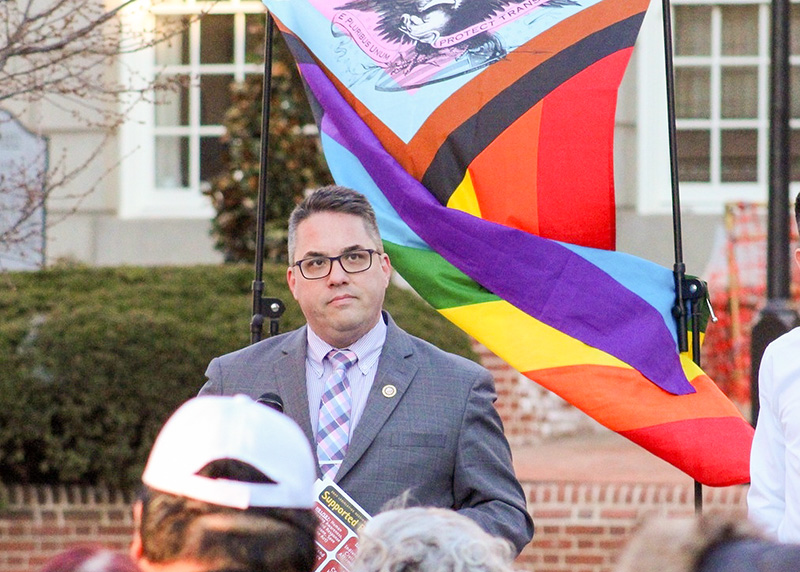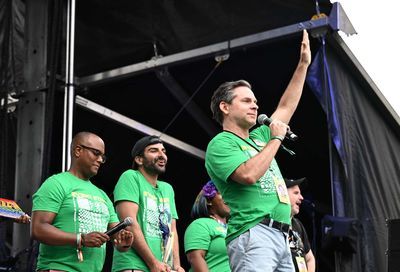Prostitution-Free Zones Under Fire
Measure to repeal potentially unconstitutional law has widespread support, but lacks the votes needed to pass the D.C. Council

The D.C. Council heard testimony last week on a bill that would repeal a controversial section of the D.C. Code that allows the chief of police to declare any public area of up to 1,000 square feet as a “prostitution-free zone” (PFZ) for a period of up to 20 days.
The provision in the law that grants the police chief these powers is found in a section of the Omnibus Public Safety Amendment Act of 2006, which passed the Council by a unanimous 11-0 vote, and is intended to force people whom police believe may be attempting to engage in prostitution to disperse from declared areas under threat of arrest. Since its passage, that section of the law has come under scrutiny and been roundly criticized by both civil libertarians and LGBT groups, with even the D.C. attorney general’s office expressing concerns over the law’s constitutional soundness.
As enacted, the law makes it unlawful for two or more people to congregate in a PFZ after being told to disperse by police. If arrested, someone can be prosecuted, fined up to $300 or jailed for up to 6 months. Critics say PFZs encourage discriminatory profiling of transgender women, in particular, when police mistake them for sex workers. Critics also say that the zones do nothing to reduce prostitution, as those who are told to disperse or “move on” by police officers will simply move to other, often more dangerous areas of the city, and contend that criminalizing those who are engaging in survival sex work will only make it harder for them to find more stable employment if they have an arrest record. Opponents of the law held a rally outside the Wilson Building in April aimed at, in part, generating support for the repeal bill.
Furthermore, Metropolitan Police Department Chief Cathy Lanier recently said during a meeting with members of the LGBT community that MPD no longer uses the creation of PFZs to fight prostitution, so the Council is welcome to repeal that law.
“We don’t use them anymore anyway, so they can get rid of them,” Lanier told the audience during that June community meeting.
The bill to repeal the PFZs was co-introduced by Councilmembers David Grosso (I-At-Large), David Catania (I-At-Large), and Mary Cheh (D-Ward 3), and is being cosponsored by Councilmembers Tommy Wells (D-Ward 6) and Marion Barry (D-Ward 8).
During the July 9 hearing, Wells, who chairs the Committee on Judiciary and Public Safety, explained why the bill seeks to repeal the PFZ statute.
“Establishing an exclusionary zone, such as prostitution-free zones, requires the government to carefully balance the harm which the zones seek to prevent against their intended utility and likelihood of success,” Wells said. “Prostitution-free zones, however, do not strike such a careful balance, but instead infringe upon guaranteed rights of individuals in our country, given that the law would be likely to be found unconstitutional.”
Richard J. Rosendall, a Metro Weekly contributor who testified in favor of the measure on behalf of Gay and Lesbian Activists Alliance (GLAA), said the organization has previously raised concerns about the law’s constitutionality and its discriminatory effect, particularly on transgender women of color. GLAA, along with groups like the DC Trans Coalition (DCTC), local LGBT and immigrant community center Casa Ruby, The DC Center for the LGBT Community, Gays and Lesbians Opposing Violence (GLOV) and Helping Individual People Survive (HIPS), have testified against efforts to expand or make permanent the existing provision allowing for the creation of PFZs.
“The use of PFZs facilitates discriminatory profiling of transgender people,” Rosendall noted in his testimony. “As our colleagues in the DC Trans Coalition note: 1) the attorney general has determined that PFZs will not hold up in court and are likely unconstitutional; 2) MPD suspended PFZ implementation and said it was working to rescind its PFZ general order; 3) eliminating PFZs is a step towards reducing violence against sex workers; and 4) eliminating PFZs makes sense from a public health perspective.”
Maneka Sinha, a supervising attorney with the Public Defender Service, testified that the PFZ statute is, in all likelihood, unconstitutional. Sinha told the Council that the PFZ statute was designed on the District’s 1997 anti-loitering, drug-free zones law, but noted that, after the law went into effect, a similar law in Chicago was ruled to be “constitutionally vague” by the U.S. Supreme Court.
Sinha said that the current PFZ provision is vague and fails to give fair notice to people who do not wish to break the law, as many of the terms such as the meaning of “congregate” or “reassemble” are not explicitly defined. The PFZ law also does not include exceptions in cases where congregating with others is protected under the First Amendment, she added.
With lawyers, police and community members backing the measure, the larger issue may be getting the bill passed through the Council, or, more specifically, Council Chairman Phil Mendelson’s willingness to bring up such a measure during an election year, as some proponents of PFZs may wrongly perceive the repeal bill as an effort to dismantle the police department’s ability to stop prostitution.
Calls to the offices of the remaining eight councilmembers were largely unsuccessful in getting many to issue statements regarding the bill or any concerns that might prevent them from supporting it. Calls to Mendelson’s office, and to Councilmembers Jim Graham (D-Ward 1), Yvette Alexander (D-Ward 7), Vincent Orange (D-At-Large), and Muriel Bowser (D-Ward 4), the Democratic Party’s mayoral nominee and presumptive frontrunner in November’s election, went unreturned as of Metro Weekly deadline. Additional calls to the offices of Councilmembers Jack Evans (D-Ward 2) and Kenyan McDuffie (D-Ward 5) were returned, but Metro Weekly was unable to receive any statement as of deadline due, in part, to a Committee of the Whole meeting dealing with an override of a mayoral veto of the budget and various pieces of emergency legislation that ran longer than expected.
Supporters of the repeal can count a sixth vote in their corner, though. A spokesman for Councilmember Anita Bonds (D-At-Large) has said she supports the bill, and looks forward to voting for it.
“Councilmember Bonds supports repeal of the PFZs,” David Meadows, Bonds’ communication director, told Metro Weekly. “She would also like to look at the possibility of decriminalizing prostitution, so maybe we could look into a commission to study what the impact of decriminalization would render.”
Support Metro Weekly’s Journalism
These are challenging times for news organizations. And yet it’s crucial we stay active and provide vital resources and information to both our local readers and the world. So won’t you please take a moment and consider supporting Metro Weekly with a membership? For as little as $5 a month, you can help ensure Metro Weekly magazine and MetroWeekly.com remain free, viable resources as we provide the best, most diverse, culturally-resonant LGBTQ coverage in both the D.C. region and around the world. Memberships come with exclusive perks and discounts, your own personal digital delivery of each week’s magazine (and an archive), access to our Member's Lounge when it launches this fall, and exclusive members-only items like Metro Weekly Membership Mugs and Tote Bags! Check out all our membership levels here and please join us today!























You must be logged in to post a comment.